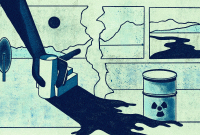Support strong Canadian climate journalism for 2025
A nuclear power plant in Eastern Canada has been offline for more than a week beyond its planned outage, forcing one province to add more imported and expensive energy, as well as fossil fuels, to its grid.
The Point Lepreau Nuclear Generating Station in New Brunswick is Atlantic Canada’s only nuclear power plant. Its current outage was supposed to last for 22 days, with five additional days allotted to address issues. However, it’s now been offline for more than 40 days. NB Power, which owns the station, said it expects the plant will be back online later this week.
“We have experienced extended outages over the past few years. Management continues to explore options to improve outage execution and estimates of Point Lepreau’s performance,” said communications officer Dominique Couture.
“... Outages are a necessary element to protect the long-term life of the station and its ability to provide safe, reliable, predictable, low-carbon base-load power.”
Point Lepreau, which began operating in the 1980s, is one of four nuclear power stations in Canada. In June 2022, it was granted a licence extension, allowing the plant to operate for 10 more years. A sizable chunk of New Brunswick’s energy mix comes from Point Lepreau. As of 2019, the province’s electricity generation was 38 per cent nuclear, 22 per cent hydropower, 15 per cent natural gas and 14 per cent coal. The remaining is a mix of wind, biomass and petroleum.
When the plant shuts down, NB Power has to take more power from the coal-fired Belledune Generating Station and purchase more hydropower from Quebec. In December 2022, the plant experienced a partial power loss, forcing it to go offline and shut down for over a month.
“That cost is passed down to the ratepayers, and burning fossil fuels, well, now you're increasing your emissions. And the whole point of Lepreau was to reduce emissions,” said Moe Qureshi, manager of climate solutions with the Conservation Council of New Brunswick.
CBC News reports unscheduled outages at Point Lepreau cost between $28,500 and $45,700 per hour, depending on variables like the time of year and market conditions. However, NB Power said those are old figures that will be updated in its annual report.
The current outage is due to a leak in a mechanical seal on a pump, identified during initial testing and maintenance, said Couture.
Ultimately, Qureshi says underdelivering power is typical of nuclear power plants.
“We have this climate crisis going on. The [Intergovernmental Panel on Climate Change] reports state that we need to solve this as soon as possible. So, in my head, I'm thinking we need to invest in solar, wind and battery storage today. These technologies take about a year or so to deploy,” he said.
“But for some reason, the New Brunswick government thinks we need to invest in [small modular nuclear reactors], which take 10 to 15 years to deploy.”






Comments
The claim that nuclear power is particularly unreliable isn't supported by the facts.
https://e360.yale.edu/features/why-nuclear-power-must-be-part-of-the-en…
The problem in NB might be a lack of nuclear management expertise - there's only one plant. Perhaps they should build another Candu, but NBPs debt load would get in the way.
The true of NB's dismal relationship with nuclear power can, in fact, be found in NB Power's debit load which is mostly from, you guessed it, having a nuclear power plant at Pt Lepreau.
NB Power needs to figure out wind, solar power backed by storage. A grid based on those is reliable and less expensive. The rest of the world is moving there at an accelerating rate. The NB government fixation on nuclear is the same kind of thinking that supported the Bricklin boondoggle.
Making cleaner, cheaper and more reliable power grids from solar & wind is not rocket science, it's just good engineering:
https://ieeexplore.ieee.org/document/9837910